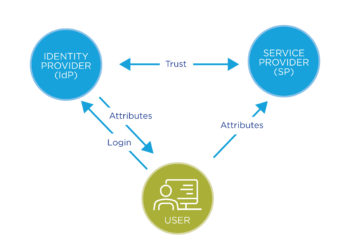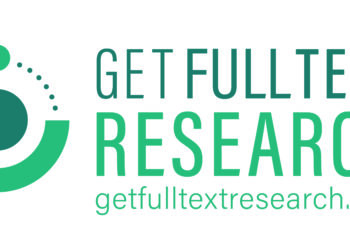Editor’s Note: Today’s post is by Ralph Youngen and Todd Toler. Ralph is the Senior Director of Technology and Strategy Partnerships for ACS Publications, and Todd serves as Vice President, Product Strategy and Partnerships for Wiley.
When we introduced the concept of GetFTR (Get Full Text Research) at the STM conference in December 2019, none of us could have predicted the next year. Then and now, the need to support and enable a reliable, secure, and simple method of remote access is under increasingly sharp focus.
Utilizing real time entitlement checks, GetFTR streamlines access to published journal content from discovery tools and scholarly collaboration networks, both for subscription and open access content. Dead ends are minimized for researchers as they can easily determine which content their institution has made available to them, both on or off-campus via the visual GetFTR link. (Think visually like the Amazon Prime trust mark). While we don’t pretend to put GetFTR forward as the sole solution, it is a more streamlined and sustainable way to support all in facilitating easier access to research, globally, from any location.
Responses have been predominantly positive, and to date, ten publishers and a further 11 integrators have already signed on. From a user perspective, we have seen month-on-month growth of positive links returned and have received very useful feedback. However, we have not been immune to criticism or misunderstanding of the service, particularly how GetFTR impacts the role of librarians and link resolvers, privacy, and the need to provide more flexibility and support for integrators of the service.
After our first full year of service offerings and developments we have been reflecting on the lessons learned and wanted to openly address the concerns we have received as well as update the community on how the service is developing.

Where are we now — lessons learned
Enhanced collaboration — We put the library user right at the heart of what we are doing
The main feedback we have received has come directly from the library community. The concerns and comments made sense to us and we were delighted to be able to, very quickly, have Elaine Westbrooks, Librarian and Vice Provost of University Libraries at North Carolina University Chapel Hill, and Lisa Janicke Hinchliffe, Professor as well as Coordinator for Information Literacy Services and Instruction at the University of Illinois at Urbana-Champaign, join our advisory board. The feedback here has been instrumental in GetFTR’s service development, and continues to be a key focus as we move forward.
It became clear very early on that there was a need for clarity around how the service could work for library users, and this year has seen a close partnership with the community to address those concerns and work through feedback. It started with several one-on-one interviews with librarians to gather feedback and has recently expanded to the launch of our librarian webinar series to provide an open user forum. We plan to continue holding events in 2021, sharing the recordings on our website when available, and soliciting feedback from the library community on an ongoing basis.
Adapted authentication routes — We introduced greater flexibility to support integrators
One of the central changes to GetFTR took place midway through this year, when we added flexibility to the service to support the needs of our integrators. First and foremost, this was around adding the capability to support institutional entitlement checks based on an IP address. This addition came about through the direct feedback of our advisory group. Our advisory group also led us to optimize GetFTR to add support for aggregators (currently in progress).
IP-based authentication remains an important part of the way in which institutions currently access scholarly resources, and will be a part of the process for the foreseeable future. When setting out, we had always said that we wanted to offer an adapted service that best suited the needs of the user and one that is both simple and seamless to adopt. Ensuring that GetFTR would be compatible with IP authentication is a direct example of that commitment. Supporting IP authentication took a bit more working time for us due to the fact that we worked very closely with legal advisors on addressing concerns relating to passing IP addresses due to GDPR.
Integrators now have the choice to utilize either an IP address or an institutional identifier to perform an entitlement check, ensuring that GetFTR can benefit as wide a group of researchers as possible. When a user follows a GetFTR link to a publisher’s site, the publisher can first attempt to validate the user’s entitlement via IP address while falling back upon Federated Authentication when needed.
Meeting the needs of the community — We listened for unanticipated use cases
As with all initiatives which were developed in 2020, GetFTR faced hurdles as the pandemic complicated the plans of publishers, researchers, universities, and everyone in the academic community. Publishers, faced with the sudden challenge of delivering research to a now almost entirely remote readership, were hesitant to adopt new technological initiatives like GetFTR. Ironically, however, GetFTR is a tool perfectly situated to these times of remote learning, teaching, and research, and publishers who had partnered with the service were more prepared to serve communities in greater need of access solutions than ever before.
One particular partner to join last year provided GetFTR with a really interesting use case and one that we have been very proud to support. Using the GetFTR API, CHORUS has been able to speed up and enhance their open access audit process. Prior to integrating the GetFTR data feed, CHORUS used a combination of manual and automated processes to audit whether article and conference proceedings Versions of Record (VoRs) or Accepted Manuscripts (AAMs) were open on a publisher’s website. By adopting GetFTR technology, CHORUS is now able to automate the metadata feed from millions of individual VoRs, checking records against a publisher’s access control systems, without having to interact with the HTML of multiple publisher sites.
For us, without losing the ethos of what GetFTR is and offers, being able to work collaboratively with partners such as CHORUS and find ways in which partners can use and implement services concurrently to support a better business and user workflow is something we continue to explore.
Flexible approach — Aggregators provide a special use case
As we know, aggregators play an important role in the delivery of content to some members of our community. Situations where content is hosted both on a publisher site and an aggregator platform present a challenge for GetFTR. As such, GetFTR has needed to make special accommodations to ensure that we best understand both use cases and needs, and provide the required support. We have and continue to work directly with aggregators to find a solution to enable GetFTR to work sustainably with their services.
As we move forward in 2021, into a much changed world and research landscape in many senses, we do so with lessons learned that continue to inform development and digital strategy. We continue to remain flexible to ensure that as we develop the GetFTR service we are first and foremost meeting the needs of the researcher and enabling a simplified workflow. We also continue to listen to the needs of all of our users and stakeholders and adapt GetFTR, sustainable, to meet those needs.
What next? Collective action is needed to reduce stumbling blocks
As Roger Schonfeld pointed out when we first started discussion about GetFTR, “it is comparatively easy for publisher to recognize the challenges and the need for collective action to reduce the stumbling blocks in the research ecosystem”, what is more challenging is finding a way for us to “collectively organize the action necessary to address them”. As we have said, we don’t profess to position GetFTR as the sole solution, but we do see it as part of that collective action. Through our continual work with an expanding body of publishers, integrators, aggregators, and through open feedback with our advisory boards and community through our seminar series, we firmly believe that we are building a flexible approach that can serve the needs of our collective community.
Collaboration is a key part of GetFTR’s ongoing development, and we continue to believe that GetFTR’s future is bright. Over the course of the next few months, we will be exploring use cases with new partners and addressing ways in which to better integrate GetFTR with other industry-wide efforts in support of community sustainability. We also continue to work closely with the International Association of STM Publishers to explore opportunities for GetFTR as part of the STM’s soon-to-be-formed operational unit, STM Solutions. We will continue to provide updates on this, and our other developments, through our community pages.
In this challenging time, when many of us are still facing a long road of continued remote working, the conversations around access and research amongst publishers, libraries, and scholarly discovery platforms around the globe are even more relevant. We hope and expect that GetFTR will contribute to improving access and removing barriers for researchers.
We are holding a seminar for publishers and integrators on 18th February at 10amEST/ 15:00GMT, and would encourage you to join to continue the discussion with us. We also continue to welcome discussion and feedback, you to get in touch with us either directly or through our contact@getfulltextresearch.com email.



